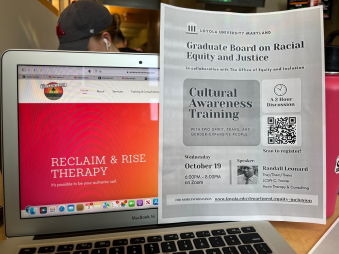Teal lipstick, purple clothing, and emotional recognition and expression are some ways Randall Leonard has learned to express themselves. As they discover their gender identity and navigate the systematic biases against gender expansive people, they are helping others do the same.
Leonard is a featured speaker on the Reclaim & Rise team in Baltimore, where they visit groups and share their experiences and knowledge about gender identity. Reclaim & Rise Therapy is a service offered in Baltimore and Washington, D.C., focusing on the healing of LGBTQ+ individuals and families, especially transgender people and people of color.
Leonard, who identifies as a non-binary person and uses they/them pronouns, explained their gender identity to students at Loyola during their speech organized by the Office of Equity and Inclusion. They emphasized how they have never felt more like themselves since they came out as non-binary.
Their speech focused on culture awareness with Two Spirit, Transgender, and gender expansive people. Leonard spoke about coping with emotions when addressing the historical roots of gender suppression as well as the barriers that gender expansive people experience when navigating the systems put in place by society.
In 2019, Leonard did a Sephora Ad that promoted gender diversity. They were selected by Sephora because they are an outspoken voice in the gender expansive community. Representation in the makeup industry excited them until they realized the system was profiting off of them by emphasizing capitalistic values.
“I want to raise awareness for all people out here so they can see someone like this and just be like, I can do it too. It also is like these companies have realized we buy makeup too and they can make money off of us. It is this whole idea of how I have to be a part of the system in order to advocate for myself,” Leonard said.
Leonard also wants recognition by the healthcare system, political system and many other structures in our society. They spoke about the importance of retraining yourself to experience emotions despite the structure of the system.
“The system has gotten us down to a point where our emotions aren’t needed. What often happens is that we fight each other in our own culture because that is what we have access to,” Leonard said.
Leonard explained that emotions protect us, and they serve specific purposes. They encouraged students to not suppress emotions because of the standards that society holds us too. Leonard wanted the students at Loyola to experience emotions and recognize they are what make us human.
Leonard connected these emotions to the idea of elders in their community. When referring to elders in their community, Leonard meant people who those in the community look up to. They call them elders as they have paved the path for many gender expansive people and they are treated with respect and dignity.
They recognized that elders of the gender expansive community have to sit with grief and jealousy for the younger person that may have access to the hormones that they didn’t. But along with that grief and anger is joy for the growth of the community and they are able to reflect on how it has changed for the better.
“The whole thing with emotions is that you are sitting there with someone you perceive as a threat because they have access to something you didn’t. But at the same time, it is what you
fought for and what your movement has achieved. You have to recognize that there will be joy there as well as anger,” Leonard said.
When talking about how individuals can help with the struggles that gender expansive people face, Leonard highlighted knowing your own biases.
“It’s all about being able to recognize when your own implicit biases are coming up and giving yourself a little bit of space to be like, ‘hey my brain is trying to defend and protect me.’ Give it gratitude but also recognize that someone else may have a different walk of life than you too.”
Leonard recognized that in the beginning people may struggle to understand the gender expansive movement, but it is important to recognize personal bias and grow from there to further support different communities than your own.
You can learn more about Leonard and the gender expansive and Two Spirit community by visiting their Reclaim & Rise Therapy site.
Featured Image courtesy of Meaghan Parsons.














































































































